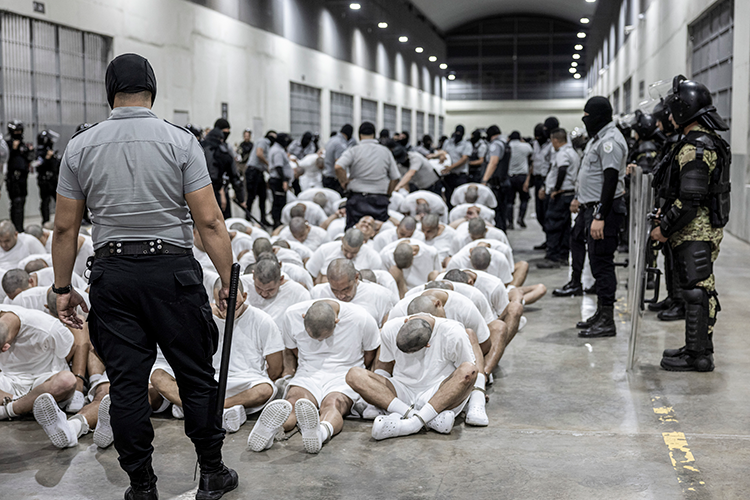Trump Administration Cites State Secrets Privilege in Controversial Deportation Case
March 25, 2025, 11:02 am CDT
A guard transfers Venezuelan deportees from the U.S. to the Terrorism Confinement Center in Tecoluca, El Salvador, on March 16. (Photo by the El Salvador presidential press office via the Associated Press)
In a contentious legal move, government lawyers representing the Trump administration have invoked the state secrets privilege to withhold information about deportation flights carrying Venezuelans, asserting that those individuals were not entitled to prior notice that would allow them to contest their deportations.
Legal Arguments and Court Proceedings
This argument was presented in federal court as part of a case examining the administration’s application of the Alien Enemies Act of 1798 to deport suspected gang members from Venezuela. The deportees have been sent to a prison in El Salvador, where conditions have been described as dire, according to Chief U.S. District Judge James E. Boasberg, who is presiding over the case.
On March 24, the government’s invocation of the state secrets privilege was described by the New York Times as an obstinate refusal to comply with court requests for transparency around these deportation flights, which are currently being challenged in the courts.
Judicial Concerns
Judge Boasberg had requested clarification about the flight schedules to examine whether the administration violated his temporary restraining order issued on March 15, which mandated the cessation of those flights. In response, the government contended that revealing such details could jeopardize personnel and sensitive diplomatic negotiations regarding the removal of individuals deemed as threats.
The refusal to disclose even private, classified information to Judge Boasberg—a former national security surveillance court judge—has raised eyebrows and concerns within legal circles. The courtroom exchanges highlighted that the government admits that deportees are entitled to hearings but argues they need not be informed of their designation as “alien enemies” or granted time to request these hearings.
Historical Context and Responses
During the hearing, Judge Patricia Millett of the D.C. Circuit remarked that the treatment of these deportees appeared less favorable than that of suspected Nazis during World War II, who at least had hearing boards for their cases. The Deputy Assistant Attorney General, Drew Ensign, strongly contested this comparison, stating, “We certainly dispute the Nazi analogy.”
As the court deliberates this extraordinary use of the Alien Enemies Act outside of wartime circumstances, Judge Boasberg noted the significant legal implications involved but deemed it unnecessary to resolve every complicated issue at this stage. He indicated that the plaintiffs have a strong likelihood of succeeding in their claims for hearings prior to deportations.
Conclusion
The ongoing case, known as J.G.G. v. Trump, reflects a pivotal moment in the intersection of immigration policy and legal rights, raising essential questions about the government’s power and the rights of individuals deported under such circumstances.
For further reading, various media outlets, including The New York Times, Politico, NBC News, among others, have provided detailed coverage of the situation.

